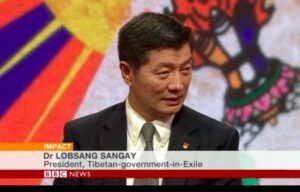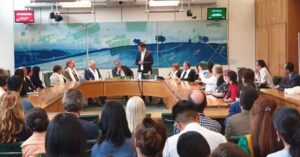 Sikyong Lobsang Sangay, President of the Tibetan Government-in-exile based in Dharamshala, has been in Britain on a ten-day visit to the UK which included a visit to Edinburgh where, on 25 June, he visited the Scottish Parliament, meeting individual MPs and addressing the Cross Party Group for Tibet. He noted that the UK’s support for Tibet was “improving” and asked MSPs to table a bill calling for resolution of the Tibet issue through dialogue based on the Middle Way Approach. He drew attention to China’s much-touted Belt and Road Initiative and suggested that MPs take a lesson from Tibet’s example where a single road built by the Communist Party of China in the 1950s led to Tibet’s complete occupation in 1959.
Sikyong Lobsang Sangay, President of the Tibetan Government-in-exile based in Dharamshala, has been in Britain on a ten-day visit to the UK which included a visit to Edinburgh where, on 25 June, he visited the Scottish Parliament, meeting individual MPs and addressing the Cross Party Group for Tibet. He noted that the UK’s support for Tibet was “improving” and asked MSPs to table a bill calling for resolution of the Tibet issue through dialogue based on the Middle Way Approach. He drew attention to China’s much-touted Belt and Road Initiative and suggested that MPs take a lesson from Tibet’s example where a single road built by the Communist Party of China in the 1950s led to Tibet’s complete occupation in 1959.
On his return to London, he visited Parliament where he sat in the Gallery to watch Hon Speaker of the House of Commons John Bercow acknowledge his presence during Prime Ministers Question Time saying, “Sikyong of Central Tibetan Administration, Lobsang Sangay, who has been here before and he is here again. He represents, in a very important way, the people of Tibet. We identify with you, Sir. It is a pleasure to see you again and I think colleagues will feel that way. I am looking forward to see you later today. Please continue your good and important work even in the face of very considerable pressures.” Prime Minister Theresa May was in the House at the time.
Later that day Sikyong addressed the All Party Parliamentary Group for Tibet, which was chaired by Rt Hon Tim Loughton MP, also attended by, among others, Hon Chris Law MP of Scottish National Party, Hon Kerry McCarthy MP of Labour Party, Hon Mary Rimmer CBE, MP of Labour Party and Lord David Alton of Liverpool. John Bercow was present and addressed the meeting, saying he was aware of the plight of the people of Tibet and of the strength, sincerity, long-standing character of their legitimate claims.
One of the highlights of his visit was a panel discussion, Climate Change and the Tibetan Plateau which took place on Friday 21 June, organised by the Tibetan Community in Britain. Prior to the discussion, the president met and thanked some 23 people who sponsor Tibetan children’s education in India.
The president was joined by well-known climate scientist Chris Rapley CBE of University College London. The discussion was chaired by renowned BBC broadcasting journalist and presenter Emily Buchanan. The University College London’s Darwin Lecture Theatre was filled with an enthusiastic audience with concerns and questions about the topic.

President Dr. Lobsang Sangay presents a talk on ‘Geopolitics of China in Europe: Tibet, a case study’ at the All Party Parliamentary Group for Tibet Meeting at Boothroyd Room, Portcullis House, London
Photo: tibet.net
Addressing a panel discussion the president focused on the strategic importance of the Tibetan plateau as the largest repository of fresh water outside the North and South Poles. “Tibet is a water tower of Asia with 1.4 billion people in downstream countries like India, Pakistan, Bangladesh and Myanmar depending on Tibet’s water” said Sikyong, adding, “It is increasingly recognised that Tibet’s climate and land use policies should not be treated solely as ‘internal affairs’ of the Chinese government as the Tibetan plateau influences climate and atmospheric changes not only in Asia but also as far away as East Africa and even Europe”.
Sangay expressed alarm at the latest report which found that the melting of the Himalayan glaciers has doubled over the last 40 years.
Professor Rapley made the argument, through powerful and illustrative slides, that the earth was warming fast and that “we have upset the energy balance of this planet”. Calling for absolute targets such as “Abolish Fossil Fuels”, he urged that climate change is happening now and happening to all of us, and that each one of us has an important role to play. He underlined the importance of preserving and protecting the Tibetan plateau, recognising its role in maintaining the temperature of this planet. Professor Rapley, besides being an eminent climate scientist is the Chair of the UCL Policy Commission on the Communication of Climate Science, and Chair of the London Climate Change Partnership, which seeks to ensure that London is the capital city best prepared for the impacts of climate change. He is a Fellow of St Edmund’s College, Cambridge and a member of Academia Europaea. In addition to his commitment to understanding and adapting to the impacts of climate change at a local and international level, he has more recently focused on the public understanding of climate change and the role of scientists in communicating with policy makers and the public.
Dr Sangay was featured in the BBC’s HARDtalk programme where he spoke about Tibet’s strategy for achieving its objectives under the Chinese leadership as well as the Tibet movement’s short and long term goals. To listen to the whole conversation, click here.




 Print
Print Email
Email